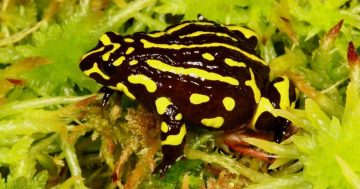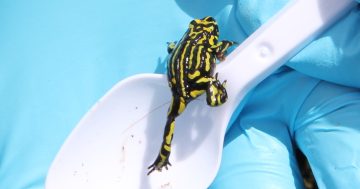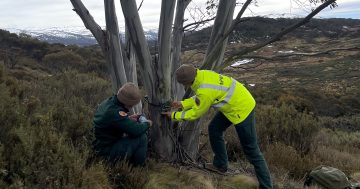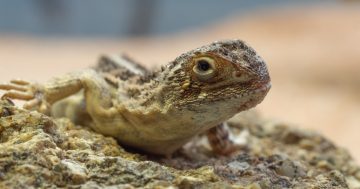 The future is looking brighter for Northern Corroboree Frogs with a joint project in the Environment, Planning and Sustainable Development Directorate (EPSDD) and Australia National University (ANU) revealing there are some signs of success.
The future is looking brighter for Northern Corroboree Frogs with a joint project in the Environment, Planning and Sustainable Development Directorate (EPSDD) and Australia National University (ANU) revealing there are some signs of success.
Welcoming the news, the Minister for the Environment, Rebecca Vassarotti said the introduction of the critically endangered frogs at a new site within Namadgi National Park was giving rise to cautious optimism.
“Our innovative approach to Northern Corroboree Frog conservation is a part of a long-running conservation program for the threatened species,” Ms Vassarotti said.
“Efforts to establish wild populations of Northern Corroboree Frogs have included releasing individuals and eggs into a new site within Namadgi National Park,” she said.
“Around 700 frogs and over 100 eggs have been released into this site over the last two years.”
Ms Vassarotti said that while the frogs had not historically been found at the location, the habitat was assessed as suitable to pursue a self-sustaining population through assisted colonisation – “meaning they get a bit of a helping hand from us just to get there.”
“Not only are the introduced frogs persisting in the face of their primary threat, the introduced Chytrid Fungus, but they are in excellent condition and breeding, indicating they have all the resources they need to thrive,” the Minister said.
“This persistence is despite the presence of Chytrid Fungus, which is everywhere.”
She said the positive results could indicate that the Namadgi National Park site allowed the frogs to survive despite the presence of Chytrid.
Minister for Planning and Land Management, Mick Gentleman said ecologists from EPSDD had worked in partnership with ANU researchers on the conservation project.
“The captive breeding program at Tidbinbilla Nature Reserve is responsible for generating animals for release, including genetic management, and ensures there is an insurance population of frogs into the future,” Mr Gentleman said.








